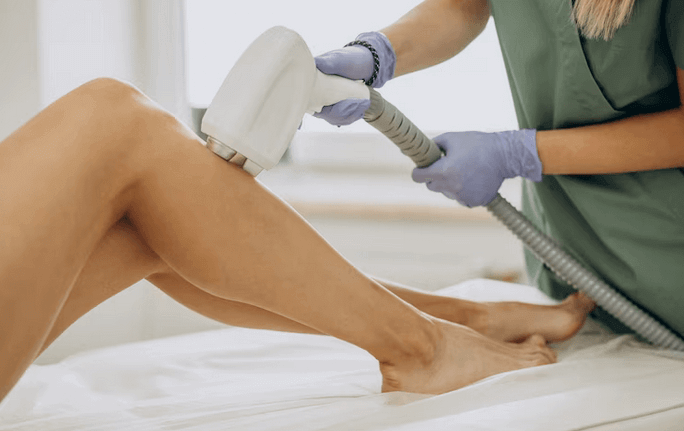
Laser treatment is a medical procedure that uses a highly focused beam of light to treat a variety of conditions. The word “laser” is actually an acronym that stands for “Light Amplification by Stimulated Emission of Radiation”. Lasers produce intense, focused beams of light that can be precisely controlled and directed at specific targets in the body.
Laser treatment can be used for a variety of purposes, such as:
- Cosmetic treatments: lasers can be used to remove unwanted hair, tattoos, and other blemishes on the skin.
- Medical treatments: lasers can be used to treat conditions such as acne, rosacea, scars, and spider veins.
- Surgical procedures: lasers can be used to cut, vaporize, or remove tissue during surgeries.
Laser treatment is often preferred over traditional surgical techniques because it is less invasive and can result in less scarring, less bleeding, and faster recovery times. However, laser treatment may not be suitable for everyone, and the risks and benefits of the procedure should be discussed with a qualified healthcare provider.
Laser treatment may be necessary for a variety of reasons, depending on the individual’s specific condition or situation.
Here are a few common reasons why laser treatment may be needed:
- To remove or reduce the appearance of skin blemishes: Laser treatment can be used to remove unwanted hair, tattoos, scars, acne, and other skin blemishes. This is often done for cosmetic reasons, but it can also help improve self-esteem and confidence.
- To treat medical conditions: Laser treatment can be used to treat medical conditions such as rosacea, spider veins, and certain types of skin cancer. It may also be used to alleviate pain caused by conditions such as arthritis.
- To perform surgical procedures: Laser treatment can be used in place of traditional surgical techniques for some procedures, such as eye surgery or the removal of tumors. Laser surgery can be less invasive, have a shorter recovery time, and result in less scarring than traditional surgery.
- To improve overall health: Laser treatment may be used to stimulate the immune system, improve circulation, or reduce inflammation, which can help improve overall health and wellbeing.
Overall, laser treatment can be a safe and effective way to address a wide range of medical and cosmetic concerns. However, it is important to work with a qualified healthcare provider to determine whether laser treatment is the best option for your specific needs.
The process of laser treatment can vary depending on the specific condition being treated, the type of laser used, and other factors.
However, here are some general steps that may be involved in laser treatment:
- Consultation: Before undergoing laser treatment, you will typically have a consultation with a healthcare provider to discuss your medical history, current medications, and any allergies or other health issues that may affect the treatment.
- Preparation: Depending on the type of laser treatment, you may be asked to avoid certain medications, foods, or activities for a period of time prior to the procedure. You may also be given instructions on how to prepare your skin or other tissues for the laser treatment.
- Application of anesthesia: Depending on the location and type of laser treatment, you may be given a local or general anesthesia to help manage pain and discomfort during the procedure.
- Laser treatment: During the procedure, the healthcare provider will use a handheld laser device to deliver a highly focused beam of light to the affected area. The laser may be moved across the skin or other tissues in a specific pattern or direction to ensure that the entire area is treated.
- Post-treatment care: After the laser treatment, you will typically be given instructions on how to care for the treated area, including how to manage any pain or discomfort, how to avoid infection, and when you can resume normal activities.
- Follow-up appointments: Depending on the type of laser treatment and the severity of the condition being treated, you may need to schedule follow-up appointments with your healthcare provider to monitor your progress and ensure that the treatment is effective.
It is important to note that the specific steps involved in laser treatment can vary widely depending on the individual patient’s needs and the healthcare provider’s approach. Therefore, it is important to work closely with your healthcare provider to ensure that you understand the process and are prepared for the procedure.
Laser treatment can offer several benefits, depending on the specific condition being treated.
Here are a few potential benefits of laser treatment:
- Precise targeting: Laser treatment can be very precise and accurate, allowing healthcare providers to target specific tissues or cells with minimal damage to surrounding areas. This can be especially important in delicate areas such as the eyes or brain.
- Less invasive: Laser treatment can often be less invasive than traditional surgery, resulting in smaller incisions, less bleeding, and a shorter recovery time. This can be especially important for patients who may have a weakened immune system or other health issues that make traditional surgery more risky.
- Reduced pain: Laser treatment may be less painful than traditional surgery or other medical procedures. Additionally, some laser treatments can actually help alleviate pain, such as those used to treat arthritis or nerve pain.
- Improved cosmetic appearance: Laser treatment can help improve the appearance of the skin, reducing the appearance of scars, wrinkles, and other blemishes. Laser hair removal can also be a long-lasting and effective way to remove unwanted hair.
- Minimal scarring: Because laser treatment is less invasive than traditional surgery, it can often result in less scarring. Additionally, lasers can be used to minimize the appearance of scars and other blemishes on the skin.
Overall, laser treatment can be a safe and effective way to address a wide range of medical and cosmetic concerns. However, it is important to work with a qualified healthcare provider to determine whether laser treatment is the best option for your specific needs.
There are several reputable laser treatment companies in Singapore, each offering a range of services and treatments.
Here are a few well-known laser treatment companies in Singapore:
- The Clifford Clinic: This clinic offers a range of laser treatments for skin rejuvenation, hair removal, acne, pigmentation, and more.
- The Belle Clinic: This clinic specializes in non-invasive cosmetic procedures, including laser treatments for skin tightening, hair removal, and more.
- Dr. Yvonne Goh Aesthetics Clinic: This clinic offers a range of laser treatments, including skin resurfacing, pigmentation removal, and hair removal.
- The Aesthetics Centre: This clinic offers laser treatments for a range of skin concerns, including acne scars, wrinkles, and pigmentation.
- The Dermatology Practice: This clinic offers a range of dermatological services, including laser treatments for skin rejuvenation, hair removal, and more.
It is important to do your own research and consult with a qualified healthcare provider to determine which laser treatment company and treatment options are best for your individual needs.




